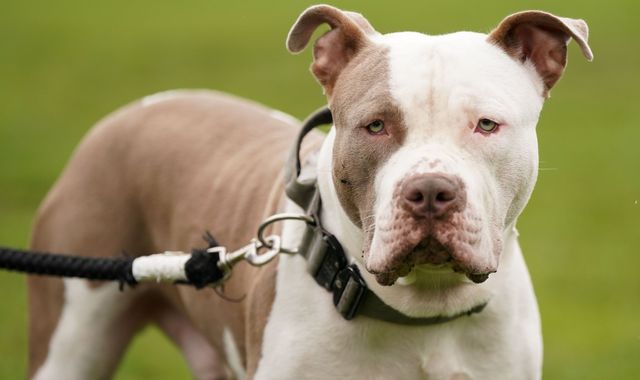On Air Now
Saturday Breakfast with JK & Kelly Brook 9am - 12pm
24 April 2024, 14:17 | Updated: 24 April 2024, 16:28

Campaigners have been given the green light to bring forward a High Court challenge against the government's ban on XL bully dogs.
In October last year, the large bulldog-type breed was added to a banned list under the Dangerous Dogs Act and since February, it has been a criminal offence to own one in England and Wales without an exemption certificate.
However, a judge has now decided that campaign group 'Don't Ban Me, Licence Me' and XL bully owner Sophie Coulthard can continue to pursue their legal challenge against the Department for Environment and Rural Affairs (Defra).
The government moved to ban XL bully dogs after a series of attacks by the breed.
But campaigners have argued that the ban is unlawful and irrational.
They have claimed that it was based on "unreliable" material and lacked a proper analysis of its impacts.
As well as that, they said the law contained "vague" standards that risked people unknowingly committing a criminal offence.
Government lawyers have said the campaigner's arguments are "meritless" and that the challenge should be dismissed.
Read more from Sky News:
Four people in hospital after horses on the loose
Two Premier League players, both aged 19, arrested
Baby Reindeer writer tells fans to stop speculating about characters
At a hearing at the Royal Courts of Justice in London on Wednesday, judge Mrs Justice Dias said that the campaigners had an "arguable" case in places.
They granted permission for the challenge to proceed to trial at a later date, despite the government's arguments.
Cathryn McGahey, KC, representing the campaigners, warned that the ban stemmed from a "hasty" announcement from Prime Minister Rishi Sunak in September last year - the day after a fatal dog attack.
This haste, she claimed, led to legal errors.
XL bullies are not recognised as a breed by the UK Kennel Club, but the government released their own definition of the breed after the ban, and they are recognised in the US too.
In written arguments, Ms McGahey claimed that Defra has "no material on which to base a rational decision that dogs involved in recent attacks were disproportionately of XL bully type".
She said the government had estimated that there were 10,000 XL bullies in the UK - but that approaching 60,000 had since been registered.
Ms McGahey said that there had been no analysis of the number of other dog breeds involved in fatal attacks, adding: "If five XL bullies have been involved in fatal attacks out of a population of 50,000, and one German shepherd dog out of a population of 10,000, then XL bullies are no more dangerous than German shepherds.
"Before seeking to impose a ban, the defendant should have conducted proper research into the types of dogs in fact involved in serious attacks."
The court also heard that restrictions on owners, which include keeping dogs on a lead and muzzled in public, would fail to prevent attacks as the "vast majority" took place in homes or on private property.
Ms McGahey argued the government were wrong to assume the breed had the characteristics of a dog bred for fighting.
But Ned Westaway, for Defra, said concluding that XL bullies had the characteristics of fighting dogs due to their connection to pitbull terriers was "rational".
He added that the government's ban had been "carefully and sensibly thought about".
In written arguments, he said that ministers were aware that XL bully numbers could be higher than 10,000, adding: "Even if the number is substantially greater than 0.1% of the UK dog population, XL bully type dogs would still have been responsible for a disproportionate, and concerning, number of dog attacks since 2020."
He also said that concluding they were "disproportionately responsible for recent dog attack fatalities" didn't depend on population and if anything, evidence of a larger population would have made a ban "more, not less, likely".
(c) Sky News 2024: Campaigners against government's XL bully dogs ban given green light to bring High Court challenge